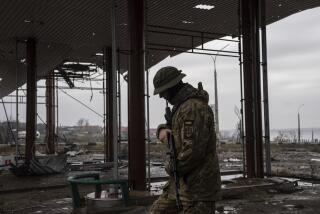But Will the Serbs Get the Message? : Bombing of positions near Gorazde hardens NATO’s line
- Share via
It has been 10 months since the U.N. Security Council authorized the United Nations to employ “all necessary means, including the use of force,” to defend designated “safe areas” in Bosnia against Serbian attacks. On Sunday and again on Monday, after hundreds of civilians had already been killed and wounded in the Serbian siege of one of those safe areas, force was finally used in the form of very limited air strikes by NATO--meaning American--planes.
As Serbian gunners kept up their indiscriminate shelling of the Muslim population in Gorazde, the U.N. commander asked for and quickly got approval for tactical air attacks. Their objective was to compel the Serbs to respect the protected status of Gorazde and to impel them to return to negotiations for a political settlement to the Bosnian war. But, by the end of the second day of direct NATO involvement in that war, it remained far from clear whether either of these goals would soon be met.
YELTSIN’S HOWL: Russia has protested loudly about the U.S. air raids, though whether more from hurt feelings because it wasn’t consulted in advance or out of historic affinity with the Serbs it’s hard to say. Probably a bit of both. President Boris Yeltsin’s government has lately used every possible occasion to reassert Russia’s claim to be a great power to whom attention must be paid, and has been taking a much more nationalistic foreign-policy line generally ever since its far-right opponents did so well in last December’s legislative elections. The change in Moscow’s position on Bosnia became especially evident less than two weeks ago. It was then that Russia, despite its earlier support for using force in Bosnia, prevented the Security Council from adopting a weak statement condemning Serbian attacks on Gorazde. Had Russia reaffirmed its support for putting military force behind the expressed U.N. will, the siege of Gorazde might have been ended and a lot of suffering might have been prevented.
CLINTON’S CALL: President Clinton of course did the right thing in authorizing the use of U.S. air power against Serb positions. As the central power in NATO and as the key decision-maker in the Security Council, this country had only one course if it hoped to preserve the credibility of both organizations: to act in the face of continued flagrant aggression. But it’s clear at the same time that Washington, aware of the lack of support for deep U.S. involvement in Bosnia among the public, in Congress and in the Pentagon, has no intention of extending itself too deeply. What it desperately wants is a negotiated end to this brutal conflict, even if that means letting the Serbs keep most of their territorial spoils.
The next day or two should tell if the Serbs have been sufficiently sobered by the American air strikes to rethink their strategy. NATO Secretary General Manfred Woerner warns that any effort by the Serbs to retaliate against U.N. peacekeepers would see NATO react “very forcefully.” That’s as it should be. But at the same time it would be helpful to know just whose armed forces Woerner is threatening to react with. Is the show in the skies over Bosnia supposed to be exclusively American, or will the alliance in fact start to behave like an alliance?
More to Read
Sign up for Essential California
The most important California stories and recommendations in your inbox every morning.
You may occasionally receive promotional content from the Los Angeles Times.













